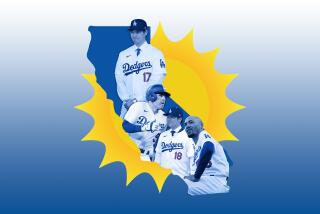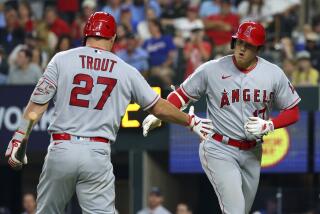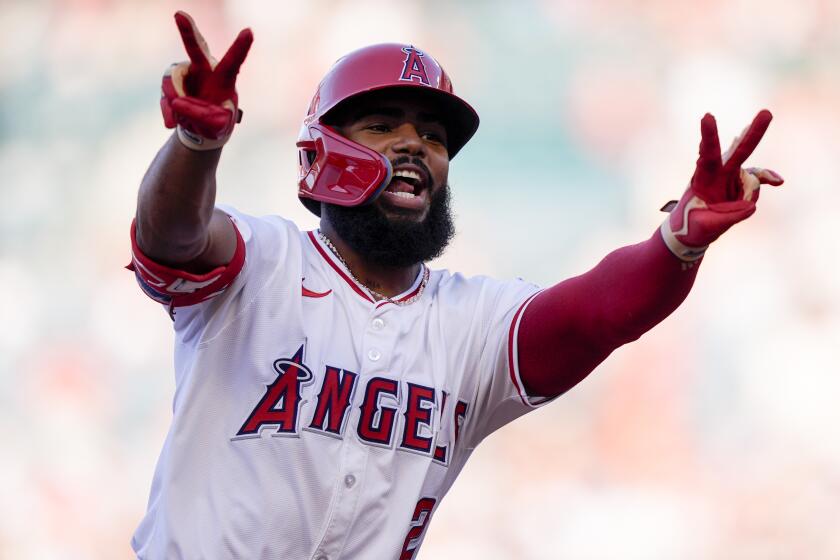Angels’ Win Is a Head Shaker
- Share via
The Angels in the American League West standings are a lot like the little guy wearing uniform No. 9. You look at the team and you look at Chone Figgins and you almost have to marvel: they’re still here.
Take it a step further. The Angels are still in the AL West discussion largely because of Figgins.
Manager Mike Scioscia spent a lot of time talking about Figgins the other day, then paused for almost half a minute as he tried to think of a way to sum it all up.
“If we didn’t have Figgy,” Scioscia finally said, “I think it would be easy to project us in a little different situation right now, as opposed to knocking on the door.”
That’s because whenever the Angels told Figgins “no” he took it to mean “not right now.” Whenever they said, “Show us whatcha got,” he produced on a big-league level. And whenever they said, “We need you,” he delivered.
He has played every outfield position, spent time at second base and shortstop, and most critically played nearly half the season at third base after Troy Glaus underwent shoulder surgery.
At the plate -- whether leading off or batting ninth -- he has kept his average near .300 for most of the season, has driven in 57 runs and even hit five home runs. His 31 stolen bases, including a steal of home in Monday’s 5-2 win over Seattle, are a reminder of the way the Angels ran the bases so aggressively in 2002, and are the most stolen bases by an Angel since 1993.
To the 5-foot-8 Figgins, it all comes down to “Believing, more than anything,” he said.
“Just believe that you can play,” Figgins said. “It’s totally a different thing than the minor leagues. But just doing what you did in the minors is what got you here. You’ve got to believe in those things.”
In 2002, the Angels brought Figgins up from their triple-A franchise in Salt Lake City at the end of his sixth minor-league season. His duties consisted mostly of pinch-running, but he did step on the basepaths during the World Series. It wasn’t the postseason hoopla or the seats jammed with red shirts that left an impression on him. It was the demeanor in the clubhouse, the way his teammates treated these moments as if they were just another game in April.
Figgins never had “just another” game. Every time he stepped on the field throughout the 2003 season it was an audition. Then someone would come off the disabled list, the roster filled up and he had to hop on the plane back to Salt Lake.
“Last year I went up and down five times,” Figgins said. “And every time I got a chance to play, I did well. For me to keep the same mentality, go down there and do well, come back up here and do well, that said a lot to me as a person that I can overcome things. I took it as a positive more than anything.”
He hit .312 in 68 games in the minors and .296 in 71 games in the majors.
He still didn’t have anything promised to him this year until after the final exhibition game, when Scioscia told him he would start the season on the big-league squad.
“Now I can at least get a place,” Figgins thought to himself. “And actually get to hang some clothes up this year.”
His next step should be to buy, even in this crazy real-estate market.
“Figgy’s quickly become part of our core,” Scioscia said. “That’s just, I think, a reflection on how hard he’s worked and how hard he’s played.
“If Figgy was a guy that could only play left field, he probably wouldn’t have gotten this opportunity. But his versatility got him this opportunity. That’s part of the value of a young player being able to do so many things. He’s a great talent, he’s a great athlete.”
(It’s bad enough that “Chone” is pronounced “Shawn”, but it’s even worse to go into the Angel clubhouse and hear everyone talking about “Figgy.” It reminds me of Christmas carols, which reminds me that no one ever explained to me exactly what figgy pudding tastes like and why people should demand it.)
Figgins never played third base at any level before he filled in for Glaus this season and it showed early on when he made the bulk of his 10 errors at the position. He listened to tips from second baseman Adam Kennedy and first-base coach Alfredo Griffin (a former major league shortstop) about how to position his feet before throwing to first.
Now he makes barehanded grabs and throws on the run from third. He uncorks big throws from the outfield. He’s even powered his way to a grand slam.
“He’s a little guy that plays big,” Scioscia said.
It’s almost as if the game now finds him. Monday night he wasn’t in the starting lineup, but he came in to play second after Kennedy injured his knee in the fifth inning, and Figgins later moved to center. He’s comfortable anywhere, in any spot -- even any temporary housing.
“As long as I get SportsCenter,” Figgins said, “I’m all right.”
Get it?
He should be on it.
*
J.A. Adande can be reached at [email protected]. To read previous columns by Adande, go to latimes.com/Adande.
More to Read
Go beyond the scoreboard
Get the latest on L.A.'s teams in the daily Sports Report newsletter.
You may occasionally receive promotional content from the Los Angeles Times.






